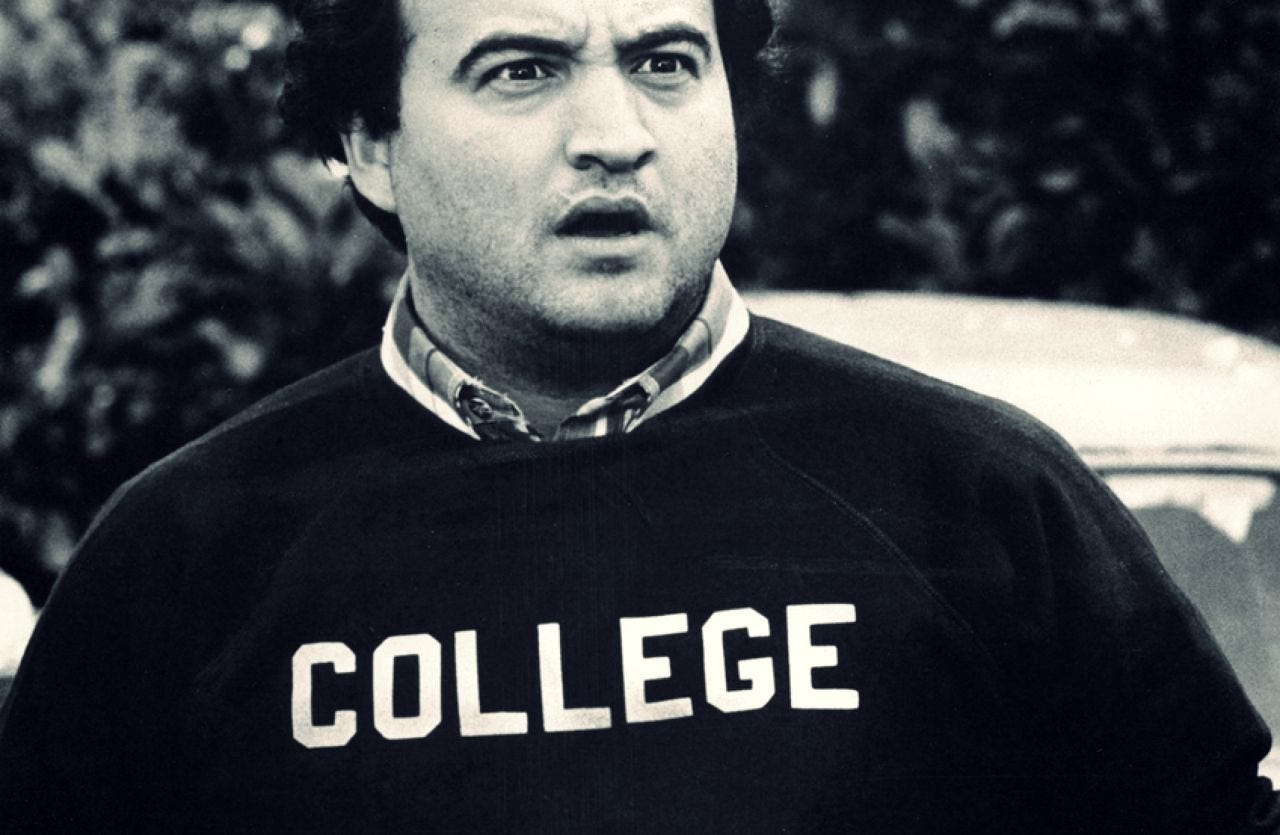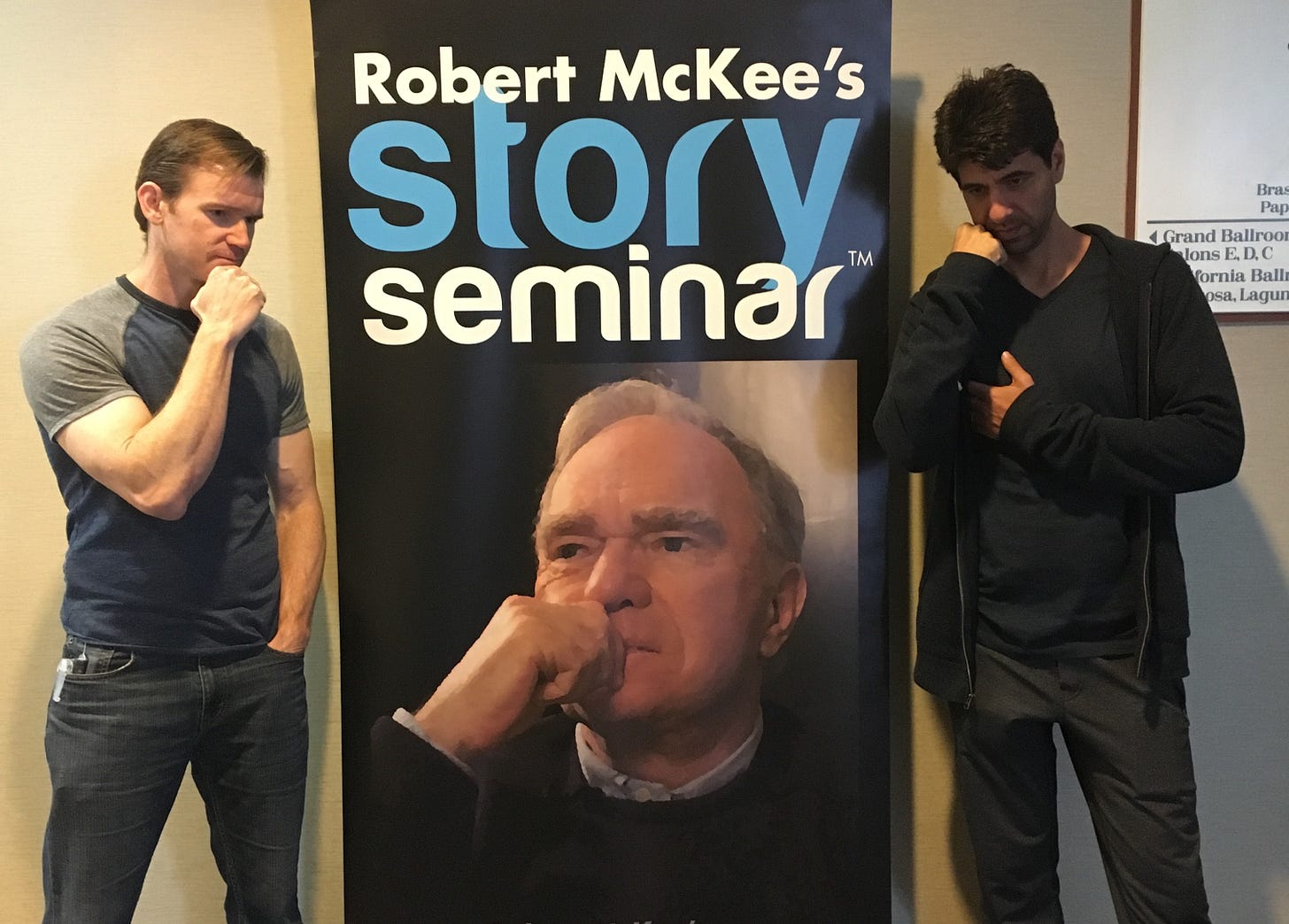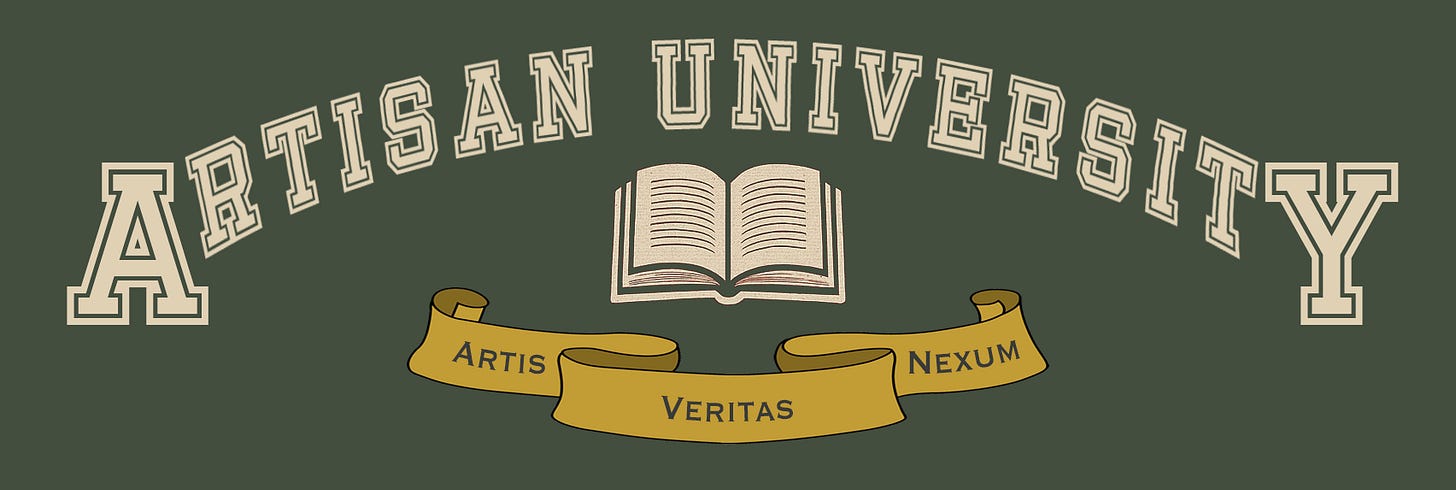Let's Get Collegiate Up In This Joint
I'm teaching a class, but not a shitty one. It's like college without the kegs.
I loved college. Part of it was the unique time of life— a handful of years in which I had all the freedom of adulthood but none of the responsibility. The rest of what I loved, though, was the academic environment itself. College was a time in which learning was important enough to be primary: to be all I was required to do.
There’s a certain beauty in learning just to learn. Yes, we want benefit from our education. Yes, we want to be able to use what we learn — maybe for career and money, maybe in a new skill to enjoy. But once we become adults, learning is given so much pressure to perform that all the joy leaves it. “This had better pay off,” we think. We have meetings to attend, mortgages to pay, and family members to ferry around like Uber drivers. We don’t have time to open our minds anymore … not unless there’s a guaranteed ROI.
That’s why online courses often feel so scammy: If they don’t beat you over the head with trumped-up benefits, you’ll never invest the money or time.
Over the years, I’ve grown to hate most online courses. There are plenty of good ones, of course (I’ve even made a few myself), but the way they have to clamor for potential students’ attention creates a slimy “survival of the most aggressive” culture that taints even the best of them. Creators know that nobody will sign up for a course because they want to learn something new, so many use FOMO and fear as leverage.
And, of course, grandiose promises. You won’t just learn something in a given course. Instead, you’ll walk away with a step-by-step process to make a lot of money right away or your money back! (If you ask for a refund, though, it’s clear that YOU are the problem.)
But the thing is, that’s not how real education works.
I’ve learned many things in my life that have helped me greatly — including increasing my bottom line — but none have worked instantly. When you learn something worthwhile, you have to work to get results. It takes time. There’s never a formula or a blueprint to follow. Real learning understands that everyone and every circumstance is different, meaning that everyone’s path will be different. A better approach is to learn principles like colleges teach, not specific steps that some unscrupulous course-makers claim are the same for everyone.
How could there possibly be a formula for success in life? How could there be a blueprint? That’s short-term, I-want-it-right-now-or-I’m-going-to-throw-a-tantrum thinking. If you go to business school, do they give you a step-by-step plan to create an instantly successful business? Or do they instead teach you how business works: the principles and best practices and time-honed skills that a dedicated student can, with time and effort, use to their benefit?
It was with all of this in my head that I decided I wanted to teach, but not in the way most online courses teach.
If I was to teach, I told myself, it had to be more like college.
Spoiler Alert!
Let’s skip to the punchline, shall we? I’ve already told you that I’m launching a new book, The Artisan Author, on Kickstarter. That campaign is live right now, and will close on August 14th.
What I haven’t told you yet — other than a single glancing mention — is that the Kickstarter has a “class” component as well, for anyone who wants more than just the book — and it’s more “college” than “the usual online course.”
(But to be clear, you can just get the book and ignore all of this college nonsense if you prefer.)
I’m calling it Artisan University, or A.U. for short. It will be taught in collegiate fashion: two sessions a week (one lecture, one discussion) for ten weeks, socratic style, no flashy promises of instant riches (or FOMO thereof), but instead grounded in time-tested principles and the ways those principles apply to unique writers of all stripes, styles, and phases. The intention is for students to attend live (virtually) like a real college, but session recordings will be available if live isn’t possible.
Oh, and it’s affordable, too. You’ll be able to buy up to more personalized attention if you’d like, but the basic levels that most will want are under a hundred bucks.
On the downside, A.U’s football team sucks and there are no frats or sororities. Keggers are difficult because beer has a hard time flowing through wi-fi. Personally, though, I think it’s cool even without the toga parties.
If you’re interested, you can follow the campaign here and be notified when it launches.
If you’d like to know more, read on.
Why I’m Doing This in the First Place (and the Existential Crisis Therein)
Almost exactly a year ago, I wrote a post called “The Cure For Loneliness.” It was a vulnerable piece wherein I described realizing that I’m at least half extrovert, and my at-that-time brand-new introverted lifestyle (writing only, alone constantly) was becoming a problem.
I told my wife Robin that I felt unsettled. She had a better word for it — a squishy one I didn’t want to apply to me. She said it sounded like I was lonely.
I didn’t like it, but it made sense. Throughout the twenty-teens, I’d had little opportunity to be lonely. I was one of the hosts of the popular Self-Publishing Podcast, which had me interacting with my friends and co-hosts weekly, and with listeners all the time. After we wrote Write. Publish. Repeat, our interaction with fellow writers ramped up even more. When we hosted The Smarter Artist Summit conference in Austin, we got to hang out with those writers in person once a year. Atop all of that, my business partner and co-author Sean and I were always traveling: to other conferences, to LA to pitch our books to Hollywood, even to Robert McKee’s Story seminar.
But after the podcast and Summit shut down — and then Covid happened, and then I left Sean’s company and went solo — all of that public interaction ended. I thought I’d appreciate the freeing-up of my schedule. Turns out I did not. I found myself alone and missing people instead.
I wanted to get back out there — and if possible, I wanted to teach like the old days. The last part was a surprise. I’d enjoyed the podcast, the Summit, and the rest, but it’d also been a grind. Discovering that I actively wanted a way to share what I knew was a bit of a WTF — but hey, it was a good one.
But what exactly was I supposed to do? The podcast was over. That entire part of my life was over. Robin, pulling from left field, suggested I try to get a guest lecture position at a college.
I thought the idea was amazing. And so that’s where I left the aforementioned “Cure for Loneliness” post: with me intending to find a way to go back to school just like Rodney Dangerfield.
Maybe you see where this is going, since I’ve already given a spoiler.
Teaching at Real Colleges is Hard. But Making My Own? That’s Easy.
After some research, I discovered that even occasional lecturing at an accredited college was a lot harder than I’d expected. I don’t have an MFA or any Masters degree, which they seem to want. Hell — I don’t even have a degree, of any sort, in English or Language Arts. (My degrees are in molecular genetics and philosophy.) Teaching without any of that, I was told, would be a hell of a task.
So people said, “Start your own thing online! If you can’t teach on campus, teach through the Internet!” But you see the problem, don’t you? We’ve already discussed this. I don’t like most online courses, and the last thing I wanted was to be another “online course guy” — especially when my real gig is to be a fiction writer.
So I dropped the issue. I let it go. I decided I’d either never teach at a college, or I’d get around to it at some nebulous time in the future.
For a year, it sat. I forgot all about it. But then I gave a presentation at the Author Nation conference last November called The Artisan Author: The Low-Stress, High-Quality, Fan-Focused Approach to Escaping the Publishing Rat Race (this one, recorded elsewhere), and it was a smash hit. Attendees loved the topic enough that I figured I’d write a book about it.
After I decided that I wanted to launch The Artisan Author book on Kickstarter, a new dilemma hit me. When I couldn’t think my way through it, I took the issue, yet again, to my wifely business advisor.
“You know,” I told Robin, “Kickstarters for nonfiction books usually offer some sort of advanced education at the higher tiers. That’s the advantage of Kickstarter. You can release a book anywhere. Kickstarter is my chance to offer something bigger for those who want it.”
I was okay with offering consulting. In the Artisan Author campaign, for instance, consulting-tier backers will get my phone number so they can text or call me with questions whenever they want for a month. Consulting made a great high-level tier, but it’s not cheap. I needed something to offer in the middle: more than the book, but less than my complete personal attention.
“So do a class,” Robin said.
“But I have course PTSD,” I reminded her. “I want nothing to do with courses. The problem with most courses is—”
“I didn’t say ‘course,’” she interrupted. “I said ‘class.’ You know — like that teaching-at-a-college thing you wanted to do last year but couldn’t find a way to make it work?”
A lightbulb went on. The challenge of making a college-type class was tricky, but if I could pull it off, everyone would win. Interested writers could learn along with me and their fellow students for a reasonable price, and I could get that “college teaching experience” I’d been looking for — albeit without smoking a pipe or having leather patches sewn onto a tweed sport coat.
But what would such a class look like? How would I make sure it was different from the kinds of courses I disliked, and instead delivered the genuinely helpful experience that everyone involved deserved — the experience I began this post by saying I absolutely loved when I was a student myself?
Here’s what I decided:
#1: Artisan University Uses The Artisan Author as its Textbook.
At first, I thought the Artisan Author book and Artisan University would be two distinct offerings. Kickstarter backers could choose to get the ebook, paperback, hardback, and/or audiobook, then add AU if they wanted to learn more.
Now, though, it’s clear that instead of being two separate things, the book and AU comprise an educational continuum with self-learning on one end and full class-learning on the other.
If you only get the book, awesome! You’ll read it like you’d read any other book.
But if you choose an Artisan University tier from the Kickstarter, The Artisan Author becomes more like a textbook.
Students of AU will read The Artisan Author in assigned pieces. We’ll then meet twice a week to cover that material. The approach is active, not passive like many online courses. You’ll need to come to class prepared, having read the book and ideally having taken notes.
#2: It’s Scheduled and Conducted Like College
Artisan University will run for 10 weeks. It begins the week of September 15th and runs through November 19th. The week of November 3 is the Author Nation conference, so there won’t be any sessions that week because I (and maybe you?) will be in Las Vegas. Instead, week 7 is something they call a “studio week” in the biz. You’re still doing work, but not meeting.
Each week will have two 90ish-minute virtual sessions: one lecture and one discussion session. Depending on the level you choose, you’ll be able to ask questions, join the conversation, and more in all sessions.
I haven’t firmed up the day/time-of-day schedule yet, but I’ll give it in the Kickstarter when it launches. The goal is for all students to attend live, because to me that’s one of the hallmarks of college: Everyone attends together, at the same time.
That’s the ideal. In real life, however, it’s not 100% realistic. No matter what time I choose, it won’t work for someone: in the wrong time zone, work gets in the way, other obligations intrude. That’s why every session will be recorded, and you can watch them afterward if you’d like.
But be there live if you can. Students are an important part of this whole thing — especially on each week’s “discussion” session — and it’s harder to participate if you aren’t there. (Not impossible, though. You can always ask questions through email to be answered live.)
#3: I’m An Instructor, Not a Guru
I know a lot about this stuff, guys. I won’t pretend I don’t. But let’s be clear: I don’t have all the answers, and I can’t give panacea advice that will solve all of everyone’s problems with no effort on anyone else’s part.
Shit, it’s embarrassing to have to spell that out.
It’s true, though, and not a lot of other people say it. A lot of online courses act like they can instantly make everyone successful, implying that the instructor knows everything and should therefore be followed to the letter at all times. This happens because claiming to have flawless, never-fail expertise is a great way to command high prices and get prospects off the fence. Admitting to being a human instead of some sort of omnipotent being isn’t an optimal sales tactic for course creators, in other words.
In truth, there are no one-size-fits-all solutions. There’s nothing that works all the time for everyone, especially when the topic itself (Artisan Authoring) has no universal, instant-success answers. This is education, folks — not some gimmicky roadmap to riches. If you believe in Easy buttons, definitely don’t enroll in Artisan University. Easy buttons don’t exist. We’re all grown up enough to know that, right?
College professors don’t claim to be perfect, and they don’t promise that their courses will create overnight successes. This is how I’ll teach. I’m good at this and I know a lot, but I’m nobody’s guru.
#4: There’s a Final Exam. (Sort of.)
To truly replicate the college experience, it felt necessary to have some sort of test or exam. In practice, though, that’s hard. I’m not teaching math. I’m teaching creative work and creative sales and marketing, and that means the “correct answers” are different for everyone.
I’ve solved this problem by “tiering” Artisan University. The most inexpensive way to attend is to “AUDIT” the class. Most, I imagine, will “ENROLL,” which allows for live participation and Q&A. Levels above that, though, will have a project-and-essay-type “final exam” (creating their own Artisan Author business plan, unique to them and based on principles in the class) that I’ll need to review one by one … which is why the level that includes the exam is more expensive.
There’s not really a grade to the final exam, for those who’ll have one. I can’t (and won’t) declare whether you are an A person or an F person. What I will do is to critique your plan/exam within its own context: i.e, based on what you tell me about who you uniquely are, what do I think of your proposed plan within Artisan principles?
#5: Artisan University Will Act as a “Pilot” for Future Colleges by Yours Truly.
I think this whole idea is cool as hell. I’m excited about it! As I’ve spent far too many words explaining, I LOVE the idea of teaching at a college. Since real colleges won’t have me (but please, let me know if you work at one that would), hosting my own pop-up online college feels like a great way to have more or less the same experience — for me and for you.
This is all to say: I want to make this work. I want to over-deliver for you. I don’t want anyone to attend AU and decide they never want to (or can’t afford to) do anything like it again. I don’t want my students to attend only once. Colleges don’t run for one semester and then never again. Nope — colleges run year after year after year.
If Artisan University is a success, and if you all find value in it, I might just do something similar the next time I want to write a book for writers — something I’ve finally accepted is part of my DNA, and that I want to keep doing even if I thought in the past that I was done.
If y’all like this, I might run a “university” every year — each one offering a book and an affordable, college-like experience to go with it for those who choose to enroll.
Maybe this is my new educational paradigm.
Maybe this, my friends, is the road ahead that some of us have been looking for.
The Artisan Author Kickstarter campaign — which contains Artisan University as well as the book itself — is live right now and will end on the morning of August 14th.









Can’t wait for this!